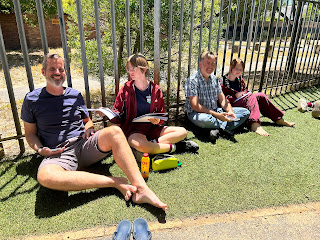The role of fun at school is crucial for creating a positive and engaging learning environment. When pupils enjoy coming to school, they are more likely to be motivated to learn, participate in class activities and develop positive relationships with teachers and peers.
Here are some ways that fun can be incorporated into the school day:
1. Laughter:
Laughter is a great way to relieve stress and promote a positive atmosphere in the classroom. Teachers can incorporate humour into their lessons or use funny videos or jokes to break up the monotony of the day.
2. Links between teachers and pupils:
Creating a personal connection between teachers and pupils can help to build trust and respect. Teachers can share personal stories or interests with their pupils to help them see them as real people, not just authority figures.
3. Seeing staff as human:
Teachers can also show their human side by sharing their own struggles or challenges. This can help pupils to see that everyone has difficulties and that it's okay to ask for help when needed.
4. Lightening the day:
Taking a break from academic work can help to refresh pupils and give them a mental break. Teachers can incorporate fun activities or games into the day to help pupils relax and recharge. Walking around the field quickly or doing cartwheels on the playground between lessons creates a little excitement to assist those who find it hard to sit still in the classroom as well as creating a lighter moment in the day for all.
5. Stress relievers:
Schools can also provide stress relievers such as mindfulness exercises or relaxation techniques to help pupils manage stress and anxiety. At Pinelands North there are several spaces for children to relieve stress: the Mandela Peace Garden, Elmer’s Space, Quiet Quad, Beck se Plek, learning support and outside the principal’s office.
6. Conversation starters:Fun activities can also be used as conversation starters, encouraging pupils to share their thoughts and ideas with each other. This can help to build relationships and create a sense of community in the classroom.
7. Making school memorable:
Fun activities can help to create positive memories of school, which can have a lasting impact on pupils' attitudes towards learning and education. Children won’t remember the tests they do but they will remember School in Action days, Readers are Leaders, Hooked on Books and Derby Days.
To incorporate fun into the school day, teachers and staff can brainstorm ideas for activities or games that align with their curriculum and pupil interests. They can also survey pupils to find out what activities they enjoy and what they would like to see more of in the classroom. Finally, it's important for teachers and staff to model a positive attitude and a willingness to have fun themselves, as this can create a culture of fun and learning throughout the school. Staff at our school have monthly Fun Days where different grades will decide what the staff will wear on a particular day. Fun days we have had recently are: wear a strange hat, crazy hair day, different shoe or sock day and a touch of bling. This dressing up by adults makes children laugh at the beginning of their day and so their load is lightened for the day. The important thing to remember in creating fun is that it doesn’t have to cost anything to implement – all it requires a little imagination and some good ‘gees’!








